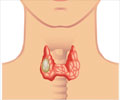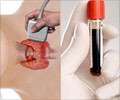All thyroid cancers are not created equal, therefore, unnecessary or excessive treatments may be avoided. A new study at The Dartmouth Institute for Health Policy and Clinical Practice finds that death from thyroid cancer can be reduced by reducing overdiagnosis.

- Drs. H. Gilbert Welch (The Dartmouth Institute for Health Policy and Clinical Practice) and Gerard Doherty (Dept. of Surgery, Brigham and Women's Hospital), asserts that this steep increase in the number of people being diagnosed with thyroid cancer, largely reflecting the detection of small papillary thyroid cancers, points to widespread overdiagnosis. Efforts to reduce overdiagnosis are needed, such as refraining from biopsying small thyroid nodules as advocated by the American Thyroid Association. But, Welch and Doherty also advocate strongly for measures designed to reduce overtreatment. These include:
- Active surveillance for selected patients with small papillary thyroid cancers.
- In cases where patients prefer to remove the cancer, Welch and Doherty state the case for a lobectomy (removal of about half the thyroid gland), the lesser of the two surgical options available, as opposed to a total thyroidectomy. The less-extensive lobectomy carries a lower risk of nerve damage, avoids the risk of hypoparathyroidism and, in many cases, allows patients to forgo the need for permanent thyroid hormone-replacement.
‘Thyroid cancers may be overdiagnosed and avoidable and excessive treatments are being given to patients who do not need them. A group of experts call for efforts to reduce overdiagnosis.’





While speculating on the reasons for this apparent contradiction, lack of knowledge of new practice guidelines, the difficulties associated with "de-intensifying" care, Welch and Doherty suggest primary care practitioners can help by educating patients about the heterogeneity of cancer: not all cancers or cancer diagnosis are the same- some cancers warrant aggressive treatment, some less aggressive treatment, others are better off left alone. "The average age of diagnosis for thyroid cancer is 50, as compared to say the average of breast cancer which is 62," Welch says. "So, potentially someone could live up to half of their life with the effects, both physical and psychological, of these treatments. That's something we need to take very seriously."
Source-Eurekalert















